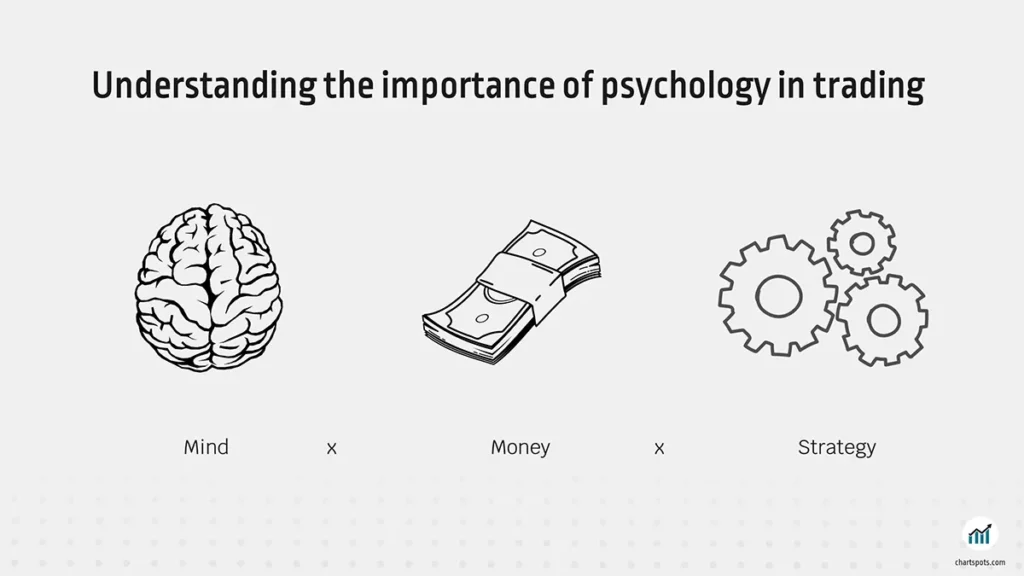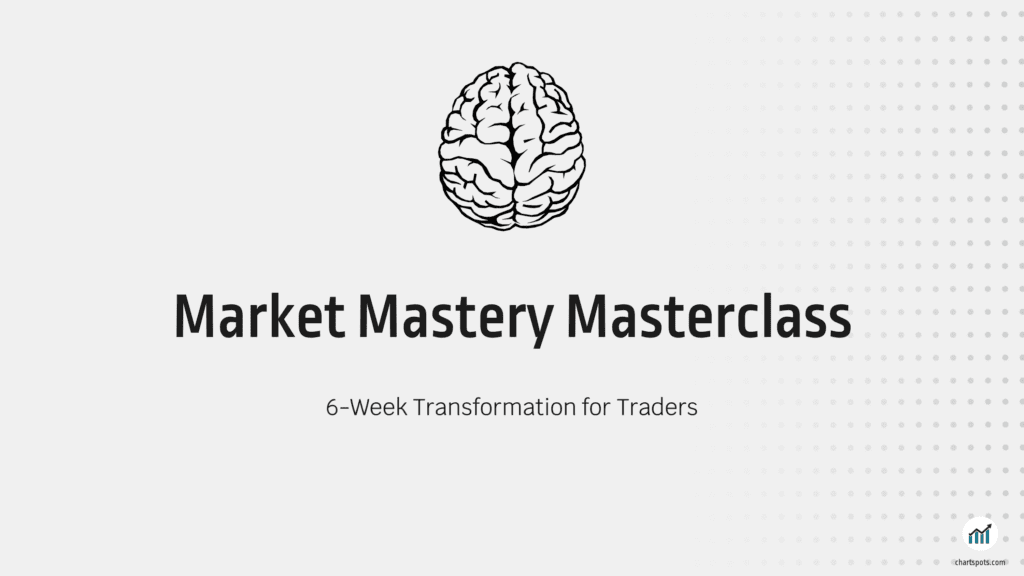
In the complex world of trading, success is often attributed to a powerful blend of three critical elements: the mind, money management, and strategy. This triad forms the foundation upon which trading decisions are made, strategies are developed, and financial outcomes are realized. Among these, the psychological aspect – the mind – stands out not merely as a component but as the central force that binds and directs the other two elements. It is this psychological dimension that ultimately determines how effectively a trader can apply their method and manage their money, influencing their capacity to navigate the markets with confidence and precision.
The importance of psychology in trading cannot be overstated, as it underpins every decision made and every action taken by the trader. At the core of every trading strategy and execution lies the trader’s mindset, which can either forge a path to success or lead to unforeseen pitfalls.
Consider the trader who, after meticulous analysis and planning, places a trade that doesn’t immediately perform as expected. The initial response of fear—fear of loss, fear of being wrong—can cloud judgment, leading to premature exit from a position that might have been profitable with more patience. Conversely, a trader experiencing a winning streak might fall prey to overconfidence, taking on disproportionate risk in the belief that losses have somehow become impossible. Both scenarios illustrate how emotional responses to market events can drastically derail carefully laid out strategies and money management plans.
A trader’s ability to maintain composure, exercise discipline, and keep emotions in check in the face of market volatility is paramount. It is the psychological readiness to accept losses as part of the game, the humility to remain grounded during winning streaks, and the wisdom to adhere to a strategy even when emotions push for a contrary course of action.

Neglecting the psychological aspect of trading is like setting the psychology variable to zero in the equation of trading success, resulting in failure regardless of other factors. This oversight leads to:
To ensure trading success, aligning psychological elements with trading strategies and money management is crucial. Building a strong psychological foundation involves:
| Area to Improve | Action Steps |
|---|---|
| Personal Biases | Identify, acknowledge, and reflect. |
| Emotional Reactions | Develop regulation strategies and set trading rules. |
| Discipline | Create and adhere to a trading plan. |
| Self-Awareness | Practice regular self-assessment and mindfulness. |
Building a strong psychological foundation is not just about avoiding negative emotions; it’s about harnessing self-awareness and emotional control to make informed, disciplined trading decisions
The journey toward trading mastery begins and sustains with a profound understanding and command over one’s psychological landscape. Key take-aways include:
| Foundation | Impact |
|---|---|
| Mastering the Mind | Sets the stage for all aspects of trading success. |
| Conquering Barriers | Enables strategic execution and effective management. |
| Ongoing Development | Ensures adaptability and growth in the trading realm. |
The essence of trading success lies deeply embedded in the psychology of the trader. While strategies and financial planning are indispensable, their effectiveness is significantly amplified when executed with a disciplined and psychologically equipped mindset.
Given the crucial role that psychology plays in achieving trading success, it’s essential to continuously invest in your mental and emotional growth as a trader. If you’re ready to take your trading to the next level by mastering the psychological aspects that underpin strategic execution and effective financial management, consider enrolling in the Market Mastery Masterclass. This 6-week transformational program is designed to equip traders with the knowledge, skills, and mental resilience needed to thrive in today’s dynamic markets.

Join the Market Mastery Masterclass and embark on a 6-week journey to:

Kevin is the founder of Chart Spots and has been active in the financial markets since 2016. With a background in IT and business consulting that dates back to 2006, he combines technical expertise with real-world trading experience. Kevin founded ChartSpots in 2017 to provide data-driven tools and insights that empower traders at all levels.
Read our Disclaimer , Terms and Conditions and Privacy and Cookie Policy.
CFTC RULE 4.41 – HYPOTHETICAL OR SIMULATED PERFORMANCE RESULTS HAVE CERTAIN LIMITATIONS. UNLIKE AN ACTUAL PERFORMANCE RECORD, SIMULATED RESULTS DO NOT REPRESENT ACTUAL TRADING. ALSO, SINCE THE TRADES HAVE NOT BEEN EXECUTED, THE RESULTS MAY HAVE UNDER-OR-OVER COMPENSATED FOR THE IMPACT, IF ANY, OF CERTAIN MARKET FACTORS, SUCH AS LACK OF LIQUIDITY. SIMULATED TRADING PROGRAMS IN GENERAL ARE ALSO SUBJECT TO THE FACT THAT THEY ARE DESIGNED WITH THE BENEFIT OF HINDSIGHT. NO REPRESENTATION IS BEING MADE THAT ANY ACCOUNT WILL OR IS LIKELY TO ACHIEVE PROFIT OR LOSSES SIMILAR TO THOSE SHOWN.
GOVERNMENT REGULATIONS REQUIRE DISCLOSURE OF THE FACT THAT WHILE THE TRADING IDEAS AND TRADING METHODS SHOWN ON THIS WEBSITE MAY HAVE WORKED IN THE PAST; BUT PAST RESULTS ARE NOT NECESSARILY INDICATIVE OF FUTURE RESULTS. WHILE THERE IS A POTENTIAL FOR PROFITS THERE IS ALSO A HUGE RISK OF LOSS. A LOSS INCURRED IN CONNECTION WITH TRADING FUTURES CONTRACTS, STOCKS, OPTIONS OR FOREX CAN BE SIGNIFICANT. YOU SHOULD THEREFORE CAREFULLY CONSIDER WHETHER SUCH TRADING IS SUITABLE FOR YOU IN LIGHT OF YOUR FINANCIAL CONDITION SINCE ALL SPECULATIVE TRADING IS INHERENTLY RISKY AND SHOULD ONLY BE UNDERTAKEN BY INDIVIDUALS WITH ADEQUATE RISK CAPITAL.
RISK DISCLOSURE: FUTURES AND FOREX TRADING CONTAINS SUBSTANTIAL RISK AND IS NOT FOR EVERY INVESTOR. AN INVESTOR COULD POTENTIALLY LOSE ALL OR MORE THAN THE INITIAL INVESTMENT. RISK CAPITAL IS MONEY THAT CAN BE LOST WITHOUT JEOPARDIZING ONES’ FINANCIAL SECURITY OR LIFE STYLE. ONLY RISK CAPITAL SHOULD BE USED FOR TRADING AND ONLY THOSE WITH SUFFICIENT RISK CAPITAL SHOULD CONSIDER TRADING. PAST PERFORMANCE IS NOT NECESSARILY INDICATIVE OF FUTURE RESULTS
TESTIMONIAL DISCLAIMER: TESTIMONIALS APPEARING ON CHARTSPOTS.COM MAY NOT BE REPRESENTATIVE OF THE EXPERIENCE OF OTHER CLIENTS OR CUSTOMERS AND IS NOT A GUARANTEE OF FUTURE PERFORMANCE OR SUCCESS
ALL INFORMATION ON THIS WEBSITE IS PROVIDED FOR EDUCATIONAL PURPOSES ONLY AND NOT AN OFFER OR A RECOMMENDATION TO TRADE FUTURES CONTRACTS, STOCKS, OPTIONS OR FOREX.